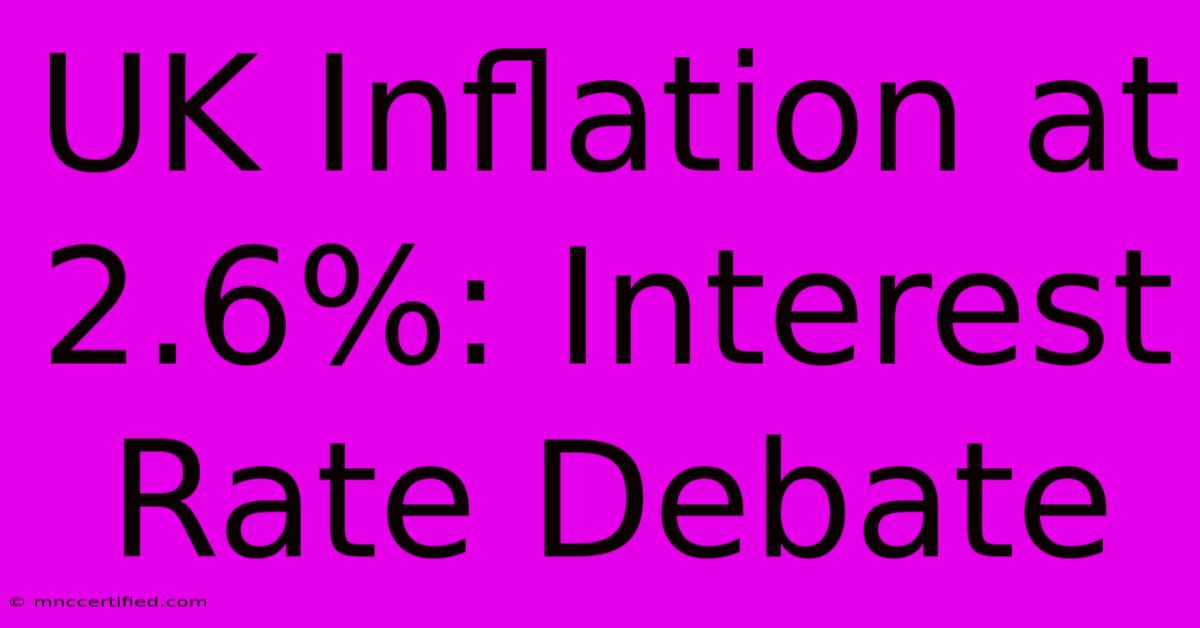UK Inflation At 2.6%: Interest Rate Debate

Table of Contents
UK Inflation at 2.6%: Interest Rate Debate Heats Up
The UK's inflation rate currently sits at 2.6%, a figure that's sparking intense debate among economists and policymakers regarding the Bank of England's next move on interest rates. While seemingly modest compared to recent highs, this level remains above the Bank's 2% target, fueling uncertainty about the future trajectory of monetary policy. This article delves into the complexities surrounding this crucial economic indicator and explores the arguments for and against further interest rate hikes.
Understanding the 2.6% Inflation Figure
The 2.6% inflation rate, as measured by the Consumer Prices Index (CPI), reflects a persistent upward pressure on prices across various sectors of the UK economy. This isn't simply a matter of temporary price fluctuations; it represents a sustained increase in the cost of living for UK consumers. Factors contributing to this persistent inflation include:
- Global energy prices: The lingering effects of the energy crisis continue to impact household bills and fuel inflation.
- Supply chain disruptions: While easing, supply chain bottlenecks still contribute to higher prices for certain goods.
- Wage growth: Increased wages, while positive for workers, can also feed inflationary pressures if businesses pass on increased labor costs to consumers.
- Brexit-related factors: Some economists argue that Brexit has contributed to increased import costs and overall inflationary pressures.
Understanding the nuances of these contributing factors is crucial to accurately predicting future inflationary trends and informing effective policy responses.
The Case for a Further Interest Rate Hike
Advocates for raising interest rates argue that the current 2.6% inflation rate, coupled with underlying inflationary pressures, necessitates further action to curb rising prices. Their arguments center around:
- Preventing entrenched inflation: Allowing inflation to persist above the target could lead to a wage-price spiral, where rising wages fuel further price increases, creating a challenging environment to control.
- Maintaining credibility: The Bank of England's credibility hinges on its ability to meet its inflation target. Failure to act decisively could undermine public trust in the central bank's effectiveness.
- Protecting the pound: Higher interest rates can attract foreign investment, strengthening the pound and helping to mitigate inflationary pressures from imported goods.
The Case Against a Further Interest Rate Hike
Conversely, opponents of a further interest rate hike emphasize the potential negative consequences of tighter monetary policy, including:
- Dampening economic growth: Increased interest rates can stifle economic activity by making borrowing more expensive for businesses and consumers, potentially leading to a recession.
- Increased unemployment: Slower economic growth often translates into job losses, exacerbating social and economic inequalities.
- Impact on mortgage holders: Higher interest rates directly increase mortgage payments, placing a significant burden on many households.
The Balancing Act: Navigating the Uncertainties
The Bank of England faces a challenging balancing act. They must navigate the fine line between controlling inflation and avoiding a significant economic downturn. The decision on whether to raise interest rates further will depend on a careful assessment of various economic indicators, including:
- Wage growth data: Sustained strong wage growth could signal a need for more aggressive action.
- Future energy price forecasts: Predicting future energy price movements is crucial for accurate inflation forecasts.
- Global economic conditions: Global economic trends significantly influence the UK economy and inflation.
Conclusion: What Lies Ahead?
The UK's inflation rate of 2.6% presents a complex economic puzzle. While the rate has fallen from its recent peak, it still remains above the Bank of England's target, creating uncertainty about the future trajectory of interest rates. The decision to raise rates further will hinge on a careful evaluation of the interplay between inflation, economic growth, and unemployment. The coming months will be crucial in determining the Bank of England's next move and its impact on the UK economy. This ongoing debate highlights the crucial role of central banks in managing macroeconomic stability and underscores the challenges inherent in navigating complex economic landscapes. Further monitoring of economic data and the Bank of England's announcements will be essential for understanding the future direction of monetary policy in the UK.

Thank you for visiting our website wich cover about UK Inflation At 2.6%: Interest Rate Debate. We hope the information provided has been useful to you. Feel free to contact us if you have any questions or need further assistance. See you next time and dont miss to bookmark.
Featured Posts
-
Bluey Movie Disney Streaming
Dec 18, 2024
-
Real Madrid Vs Chelsea Team Lineups Revealed
Dec 18, 2024
-
Wind Fueled Fire Near Jurupa Valley
Dec 18, 2024
-
George Michael Andrew Ridgeleys Reflection On Time
Dec 18, 2024
-
Who Is Fallon Sherrock Dating Net Worth Revealed
Dec 18, 2024